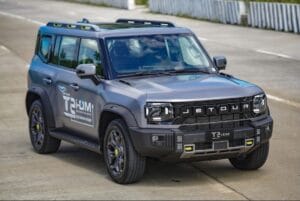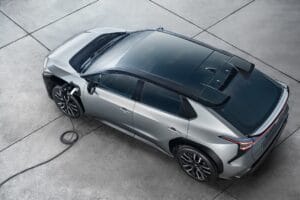MOBILITY | Motorcycle ABS will be mandatory in Thailand by 2024
Bosch to produce motorcycle ABS in Thailand from 2022 for two-wheeler & powersports.

Source: Bosch
To achieve its vision of making motorcycle riding safer, more efficient, and fun, Bosch makes market-specific products and solutions available to global two-wheeler manufacturers.
In order to meet the increasing demand for safety systems in the Asian market, Bosch plans to start production of motorcycle ABS at its Amata plant in Rayong, Thailand, in the second quarter of 2022. Following Japan and India, therefore, the Amata plant will be Bosch’s third manufacturing site for motorcycle ABS in the world. This global manufacturing network allows Bosch to support global two-wheeler manufacturers’ efforts to optimize their supply chains. “With ABS10 light and base, we provide dedicated safety systems for the small commuter scooters and motorcycles that represent a major mode of transportation in ASEAN. Our customers will benefit from local production at an established plant that already has experience of producing four-wheeler ABS systems,” says Geoff Liersch, president of the Two-Wheeler & Powersports unit at Bosch.
Since 1996, the Amata plant has been growing in importance as a manufacturing site, producing a range of four-wheeler automotive components in the fields of chassis systems, electrical drives, and powertrain. Four-wheeler ABS products have been produced there since 2014.
Stricter safety standards
On May 15, 2021, the Thai Department of Land Transport announced in the government gazette that ABS is to be mandatory for all new motorized two-wheeler vehicle models from 2024. In addition, it will be mandatory for all existing models with an engine displacement of more than 125 cc from 2026. According to the World Health Organization (WHO), the rate of road-traffic fatalities in Thailand is the highest in the ASEAN countries. While the figure for southeast Asia as a whole is for 20.7 deaths per 100,000 inhabitants, the figure for Thailand is 36.2. In southeast Asia, accidents involving motorized two- and three-wheelers account for 43 percent of all road traffic deaths.
Safer roads
Greater two-wheeler safety requires awareness and education of riders as well as the installation of vehicle safety systems. Motorcycle ABS supports riders while braking, even when braking hard or riding on slippery roads. It prevents wheels from locking up, and ensures vehicle stability and optimum deceleration. Bosch accident research studies show that if all two-wheelers were equipped with ABS, roughly 25 percent of accidents involving motorized two-wheelers could be prevented. “User-centric mobility is at the heart of Bosch’s business, and motivates us to develop technology that will make mobility safer for all road users”, adds Martin Hayes, regional president of Bosch Southeast Asia. “This development cements Bosch’s commitment not only to road safety in general, but to the countries we operate in.”




